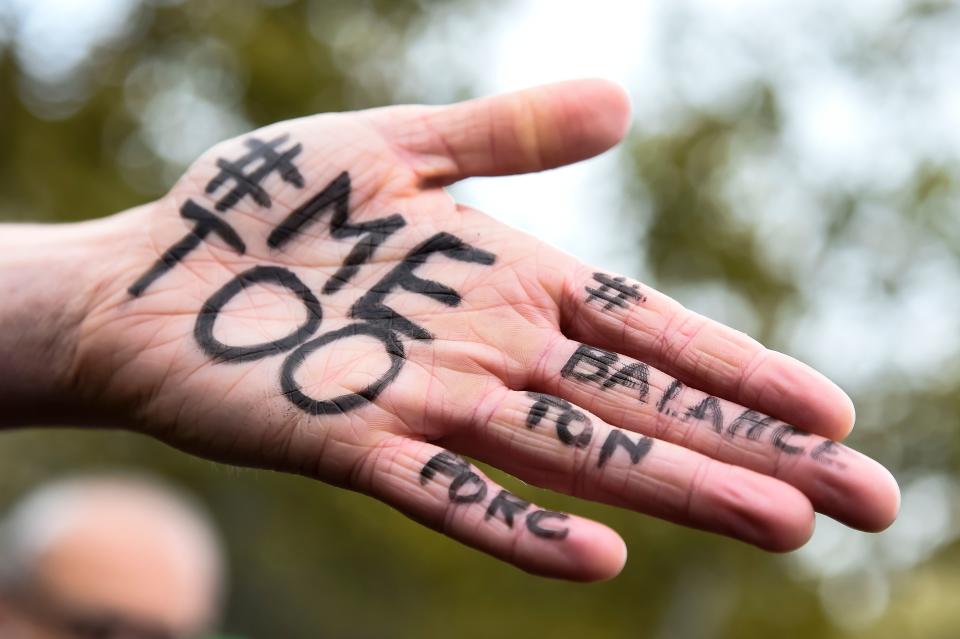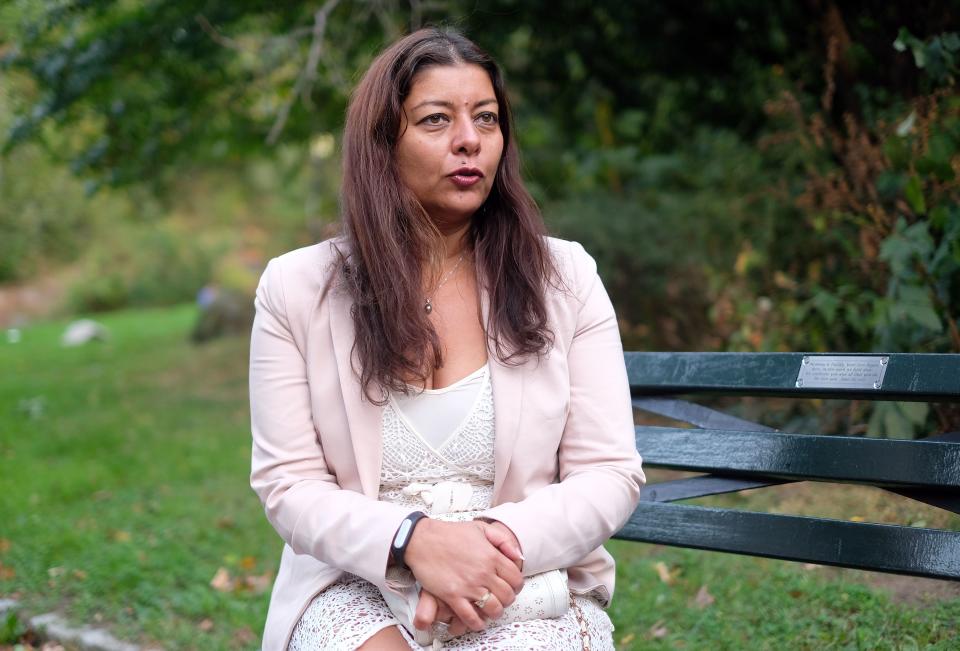French women and #MeToo: It's complicated
There are almost as many online guides to achieving that mysterious French-dame coolness as there are people in France: There’s the French girl’s guide to winter beauty, the French girl’s guide to eating, the French girl’s guide to bangs, the French girl’s guide to Halloween, and even the French girl’s guide to hating French girl guides, just for starters.
But in this moment of reckoning for sexual assaulters, there is no French girl’s guide to the movement known as #MeToo (with the exception of this New Yorker spoof). There is a French hashtag equivalent — #BalanceTonPorc or “expose your pig” — but beyond that, it’s complicated.

That’s ultimately because many French women disagree about the validity of the movement itself, and whether its American counterpart is even contextually relevant to French culture.
On one side, there are French women like Sandra Muller, a journalist who coined the hashtag #BalanceTonPorc in mid-October 2017, just before American actress Alyssa Milano tweeted #MeToo. Muller — whose sexual harasser is suing her for defamation, despite admitting to what she’d accused him of — has created a GoFundMe for her own legal expenses, and also plans to create a victim relief fund, similar to the Legal Defense Fund the #TimesUp organizers in the U.S. started, she tells Yahoo Lifestyle.

Meanwhile, Catherine Deneuve and a legion of 100 other French women had an equal and opposite reaction. Deneuve and her cowriters say of #MeToo, “It is the characteristic of Puritanism to borrow, in the name of a so-called general good, the arguments of the protection of women and their emancipation to better bind them to a status of eternal victims, poor little things under the influence of demon phallocrats, as in the good old days of witchcraft.” Brigitte Bardot — the French actress and sex symbol of the mid-20th century — chimed in by saying that the American actresses who launched #MeToo (Kerry Washington, Ashley Judd, and Reese Witherspoon, among others) are hypocritical in that they’ll “tease” Hollywood producers for covetable parts.
Even French President Emmanuel Macron expressed his own reservations about the lengths #BalanceTonPorc has gone. After defending France’s legal aims at curbing street harassment, wherein French lawmakers proposed a $111 fine for those who catcall women, Macron said, “We are not a puritan society,” referring to French culture’s notoriously high sexual tolerance, particularly when compared with that of the United States.
Whether you think #BalanceTonPorc and all its iterations is puritanical or necessary depends on how you define “feminism” and the wave of it under which you grew up, Muller suspects.
“We have to think about the notion of ‘feminism’ and reinvent it to make it … another word with another meaning, because there are feminists who say, ‘I can’t recognize myself in this feminist movement,'” Muller says. “For me, I am a ‘silence breaker,’ not a ‘feminist,’ because I think we need a new word for feminism.”
Muller also opines on whether age has affected what some French women categorize as assault and harassment compared with what Deneuve called a French man’s “indispensable freedom to bother” women. Deneuve, in her 70s, and Bardot, in her 80s, represent “a gap [between older and younger French women,] because older women think the sexual revolution in France was just that, they think of it as the feminist revolution in 1968, as the same thing. But no, the sexual revolution was part of the feminist revolution but only part of it,” Muller says. “The new generation doesn’t recognize themselves in those women.”
Alternatively, an opinion piece in the French newspaper Le Monde argued that young women today suffer from “millennial arrogance” in thinking that their own romantic pursuits wouldn’t be met with reciprocal sexual advances. (Yes, really.) Referring to “Grace,” the unidentified woman in the Babe.net account of Aziz Ansari’s sexual aggression, and “Margot,” the fictional character in The New Yorker short story “Cat Person,” the Le Monde author says, “[these women] seem to have no awareness of the logic of reciprocity at work in desire. They behave like spoiled children. They want the prince to make an exception for them, but they refuse to make an exception for the toad.”

If the disagreement over #MeToo is not generational (not everyone thinks it is), then it’s perhaps the result of a confrontation with France’s most deeply ingrained cultural cornerstones, like the art of seduction or French cinema.
Take the romanticization of French culture (the source of all those aforementioned guides). Within the many idealized narratives, women are the objects, and men are the subjects who pursue women in heteronormative encounters. “Yes, French men chase French women, and French women kind of expect it,” read one guide, by Debra Ollivier, author of a book titled What French Women Know: About Love, Sex, and Other Matters of the Heart and Mind.
French women also protect and admire their men, preferring their company more than American women do of their own, claims Ollivier (a gross generalization, at best). “I noticed this when I came back from France [to live in the States],” her story noted. “I would hang out with young moms, and there would be a lot of commiserating about men. In France, you just don’t do that. French women love men, a lot. They prefer men to be in the picture, not out of it. There will never be a war of the sexes in France.”
It’s certainly a well-worn cliché of French culture that French women aim to please their men. As Simone de Beauvoir — one of the most important writers of the last century — put it, “American women have only contempt for French women always too happy to please their men and too accepting of their whims.”

While Beauvoir laid the groundwork for contemporary feminist philosophy in her magnum opus, The Second Sex — enumerating how society teaches women to be feminine, how girls believe in and worship a male god, and that men are masters of their own lives and of sexual experiences — a boys’ club of young directors created a flood, rather a wave, of new cinematic standards dubbed la nouvelle vague. It would ultimately have a global impact on the trajectory of cultural depictions and cinematic experiences, as noted by filmmaker Martin Scorsese, who has said, “the French New Wave has influenced all filmmakers who have worked since, whether they saw the films or not. It submerged cinema like a tidal wave.”
With all due respect for what French new wave did for modern moviemakers, it was by and large an era created by men, for men, and through a man’s perspective, save for a few notable exceptions like director Agnes Vardas (Cleo 5 to 7). The goal of some of the most iconic films of French new wave (many of which Bardot would eventually star in) included advancing on “the art of making pretty women do pretty things,” at least according to one of the era’s most prominent directors, Fran?ois Truffaut, and like-minded critics like Jean Georges Auriol. (And it doubly reinforced and normalized the idea that women operate in an object-subject manner with men.) It can be tough to separate what the French herald as the be all and end all of cinematic experience and gendered power dynamics.
As for Deneuve and Bardot, among other French women who still believe #MeToo is a witch hunt, perhaps an American girl’s guide to internalized misogyny might be helpful. Aren’t there enough French-girl guides as is?
Read more from Yahoo Style + Beauty:
How Larry Nassar’s victims are healing thanks to cathartic statements
Why Adriana Lima and Emily Ratajkowski can both be feminists, no matter how much skin they show
Follow us on Instagram, Facebook, and Pinterest for nonstop inspiration delivered fresh to your feed, every day. For Twitter updates, follow @YahooStyle and @YahooBeauty.
